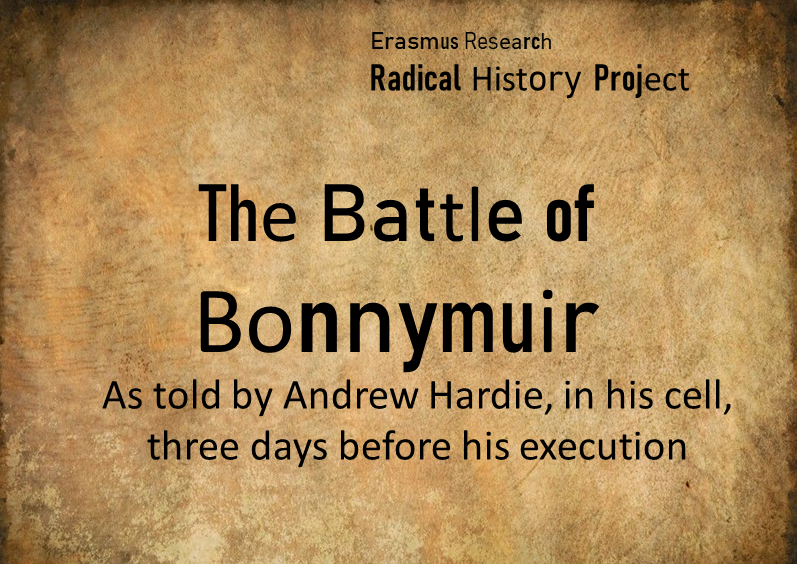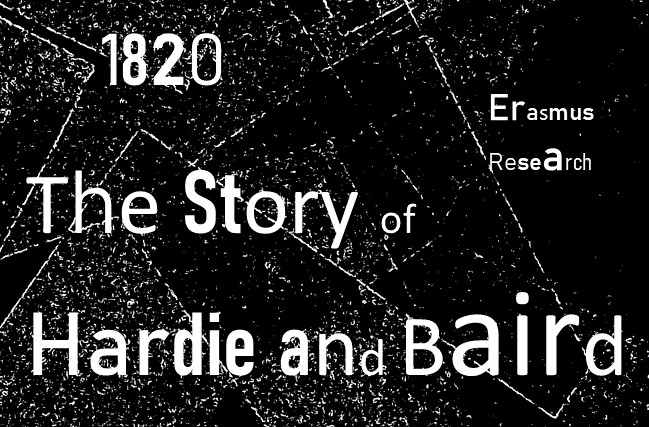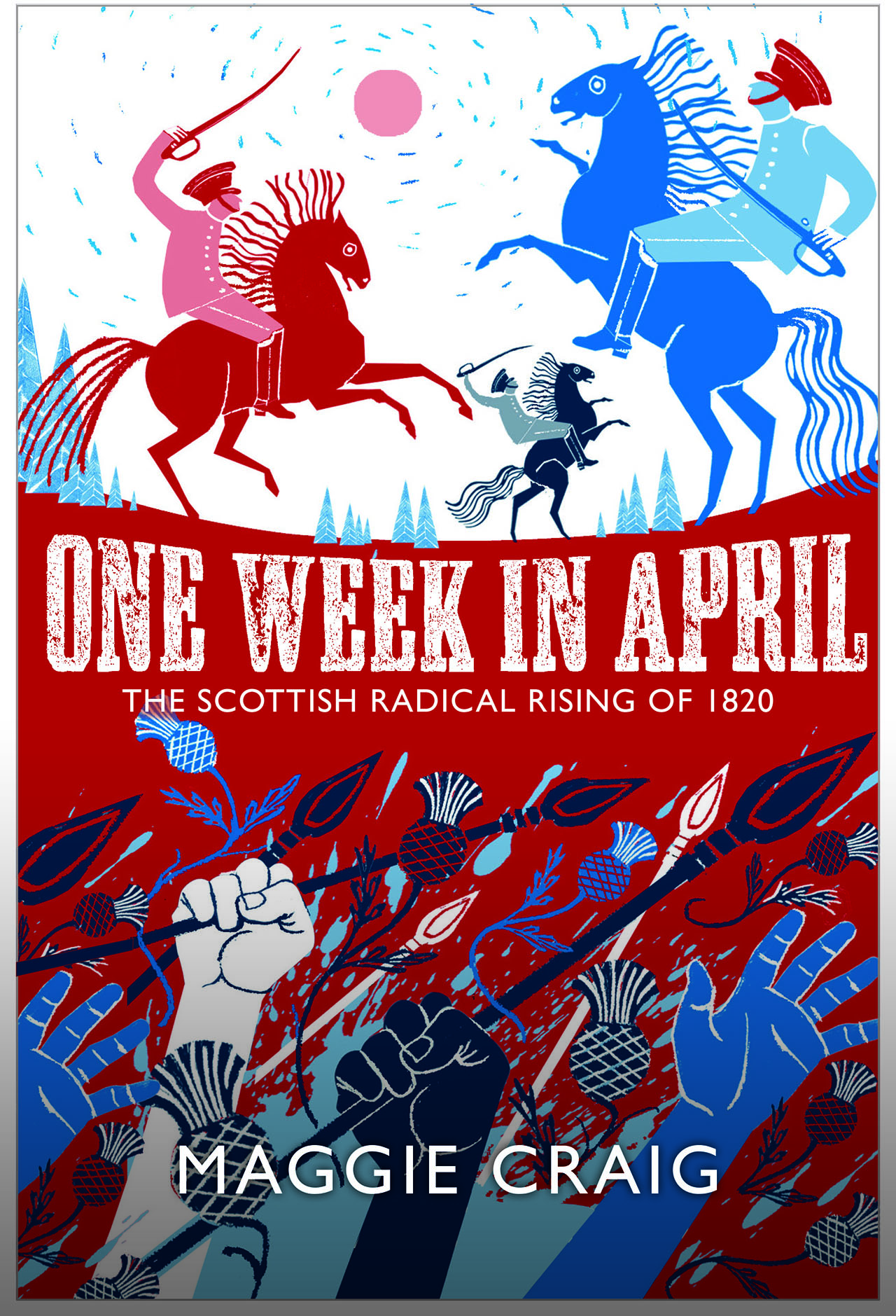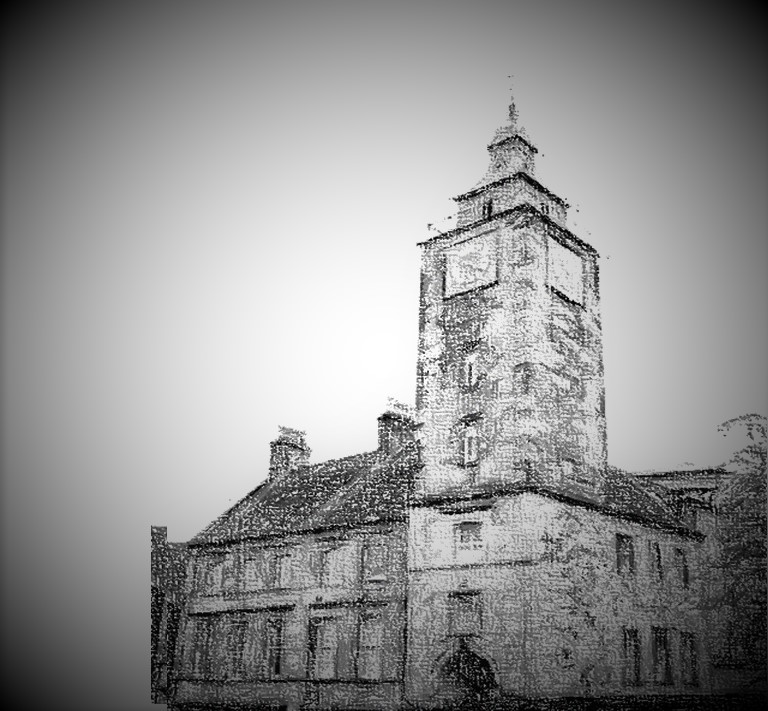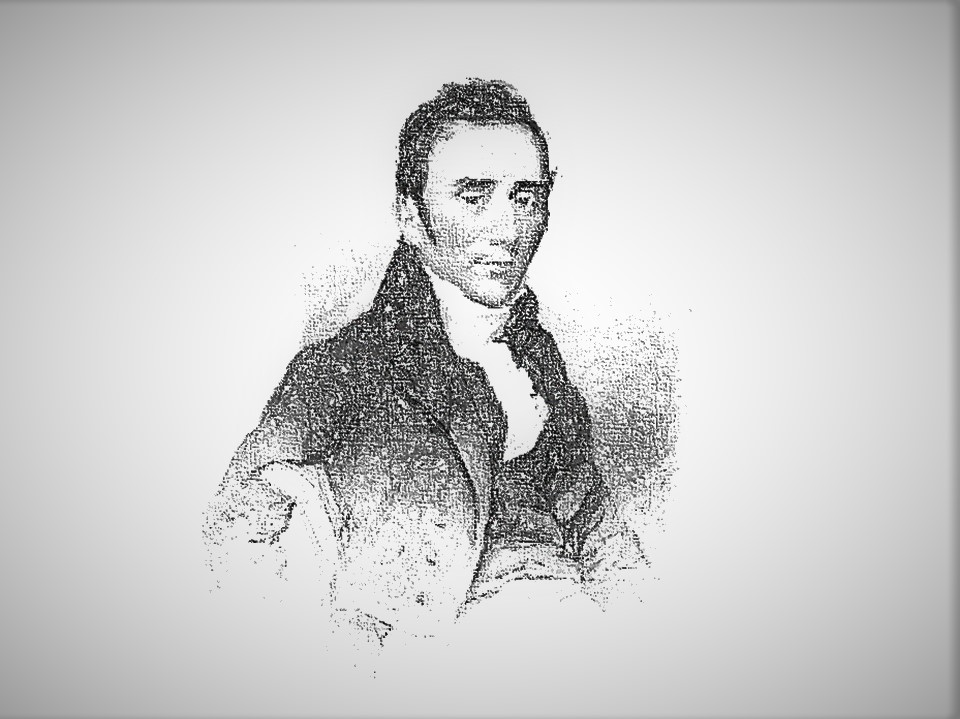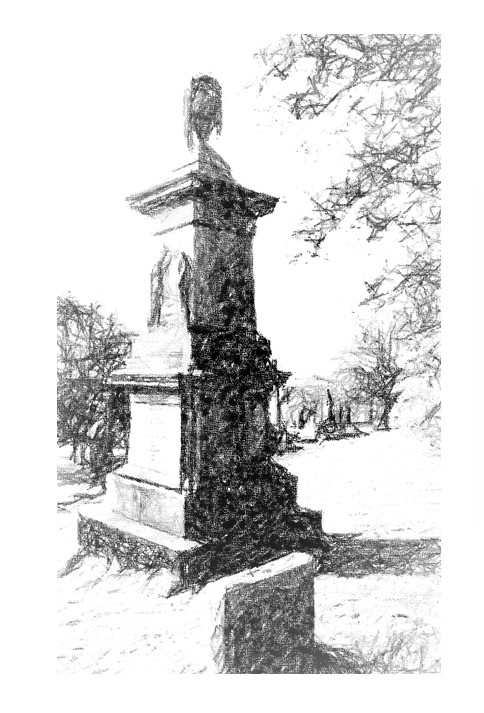
This is Chapter XXI, the last in the serialisation, the wording reproduced exactly as it appeared in the Stirling Sentinel, on Tuesday 2nd July 1889.
CHAPTER XXI
A Revolution in Dinners – Erection of the Monument to Baird and Hardie – Peter Mackenzie’s Speech on the Occasion – The Political Martyrs Remains Removed to Glasgow – The Empty Grave in Stirling Churchyard – Baillie Ronald’s Laudable Interest in Marking the Spot – Conclusion
Part of Mr Peter Mackenzie’s programme in connection with the erection of the monument to Baird and Hardie at Thrushgrove, was a public dinner, his announcement of which may be quoted as exceedingly characteristic and as introducing his account of the dinner itself. “Hitherto (he says) the expense of almost every public dinner in Glasgow has been on such an extravagant scale as to exclude the industrious classes from attending them. We have, however, been able to effect a little bit of revolution in this respect, for Mr Sinclair, of the Argyll Hotel, enables us to announce that he will furnish a good, plain and substantial dinner in his house next Saturday afternoon at four o’clock, at one shilling and sixpence per head; and the Argyll Hotel, as our Glasgow readers know, is one of the most respectable in the city. Therefore we hope that this dinner will not be grudged on the score of expense at any rate.
It is peculiarly calculated for the humble but respectable working classes; and we sincerely declare that we would far rather see it attended by them, or, to use a late sneering expression of the Glasgow Courier, by the ‘unwashed artizans’ of our city, than by all the purse-proud, empty-headed, rotten-hearted, aristocratical Tories and Nabobs in Glasgow, many of whom have sprung up from places little better than the dung-hill, though they now strut through our streets and Exchanges as if they were the sovereign lords of creation. We shall be quite contented if the dinner is only attended by fifty honest Radicals altogether, but of course, we shall have extreme pleasure in seeing it attended by many more….And now, having originated this matter, with the best possible intentions, we beg to say a few words in conclusion.
We know very well that there is a party at work in Glasgow against us just now, as they have long been; but their petty, envious and malignant feeling we can well despise. If, however, any wolves in sheep’s clothing shall come among us to create dissension, or to interrupt the harmony of this meeting, we hope they will be marked down and disposed of in a proper manner. It is in vain to expect that the newspapers will lend us any support; we never got any from them and do not want it. But we undertake that a full and authentic report of the proceedings will be printed and published on the Saturday following, till which time we have resolved to defer the publication of the concluding No. of the Spy System, in order that the proceedings connected with the monument will be delivered with the concluding No. gratis. Now, then, let us see whether next Saturday the real Radicals of Glasgow will come forward to attend this dinner, and thereby, do honour to those who were persecuted, slain and slaughtered in the worst of times.”
The attendance at the dinner more than realised Mr Mackenzie’s expectations. He states in the report appended to the concluding number of “The Spy System,” that upwards of 120 respectable individuals sat down to an excellent and substantial dinner. No account is given of the proceedings at the erection of the monument, which duly took place on the day fixed, all the oratory of the occasion being apparently reserved for the banquet. Peter Mackenzie himself occupied the chair, which no one had a better right to fill, and in proposing “The Memory of Hardie and Baird,” he said that his attention had long been attracted to the machinations of that scoundrel of a spy, the notorious Richmond, and from less or more he had resolved to lay before the public a concise statement of the facts concerning Richmond and his unprincipled coadjutors, which, strange to say, with one or two solitary exceptions, had scarcely been so much as alluded to by the press in Scotland.
It was after he had taken this resolution, and made intimation of it through the little wicked publication with which he gloried to be connected, that he was waited upon by the venerable mother of Andrew Hardie, who begged him to peruse the letters of her departed son. This he did with a degree of satisfaction which he could not there adequately express, for he would be free to acknowledge that, in common with many others, he was originally led to entertain a less favourable opinion of Hardie and Baird than that which he now did; but who could peruse any of their letters without emotion? Who would now dare to say that they were the productions of a set of bloody traitors, or of hardened ruffians as they were held up to be by the contemptible faction that lately domineered in this country?
For his part, after studying their conduct from first to last, he did not scruple openly and fearlessly to assert that Andrew Hardie and John Baird were virtuous and patriotic individuals and as such their names would now go down to posterity. They were the victims of a foul, odious and cold-blooded conspiracy hatched up as was now evident by the base Government of Sidmouth and Castlereagh, and its hirelings and understrappers in the provinces. It was evident that Hardie and Baird took up arms in the belief that the spirit of the country was determined no longer to submit to tyranny and oppression. On that account he honoured and respected them. He regarded them as martyrs in the cause of reform, and their blood, he had no doubt had materially cemented it. It afforded him much satisfaction to know that he had been instrumental in relieving the pressing wants of Hardie’s mother prior to her decease for she had received upwards of £10, a sum much greater than she had ever anticipated from such a cause; and poor as he himself was, he had resolved not to put one farthing in his own pocket by the publication of The Spy System, but to apply the proceeds and to direct his whole energies to the erection of a monument to those calumniated, yet brave men, who risked their lives, as they honestly believed they did, in the cause of freedom.
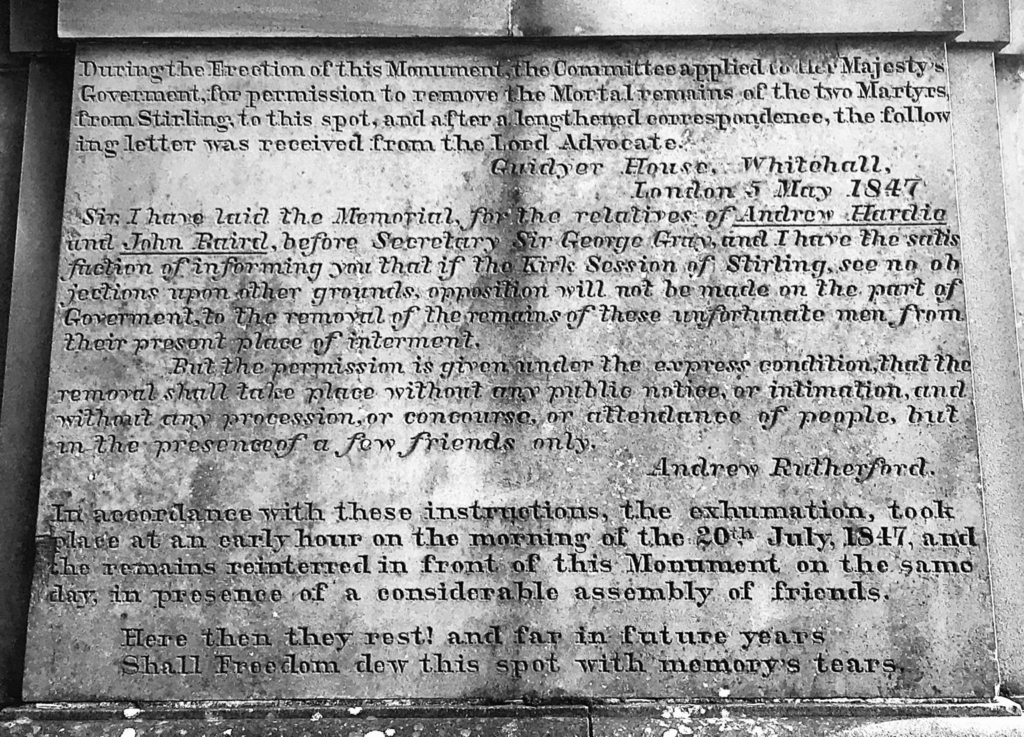
It was intended, as they knew, to erect the monument over their graves in Stirling Churchyard, and to the honour of the Rev. Mr Bennie, of Stirling, and the Kirk Session, they offered every facility in their power to the erection of the monument; but after some further procedure, Provost Forman, at Stirling, interfered, and offered such contemptible, narrow-minded opposition, that before it could have been vanquished by going through the tedious forms of the law, several years might have elapsed. Mr Mackenzie concluded a long speech, embracing several other topics by reading the inscriptions on the monuments, which were as follows: –
THIS MONUMENT ERECTED,
10th November, 1832,
ON THE LANDS OF THRUSHGROVE,
The Property of
JAMES TURNER Esq.,
Where, on the 29th of Oct., 1816, and in spite of every opposition, 40,000 Inhabitants of Glasgow first bravely met and petitioned the Legislature for a redress of grievances, and for a Reform of the Representation of the People in the Commons House of Parliament.
———
Here lies their slaughtered, mutilated frame,
Who fell to Liberty, like martyrs true,
Who keenly felt the Patriot’s purest flame,
And met their fate, as martyrs always do –
Despising death, which ne’er can patriot’s soul subdue.
Calmly they death’s dread apparatus viewed,
Then upward turned their heaven-directed eye,
Serene, collected, firm and unsubdued,
Their country’s wrongs alone drew forth their sigh –
And those to them endeared by nature’s holiest tie.
Though falsely styled “low traitors” when they fell,
Yet shall their names, revered, soon rank with those
Of Hampden, Sidney, Wallace, Bruce and Tell,
Who nobly bled to heal their country’s woes,
Whose enemies were man’s – were Freedom’s deadliest foes.
[The above written for the gravestone at Stirling.]
“The Memory of Hardie and Baird” was then drunk in solemn silence. A number of other toasts followed, and an interesting incident was the appearance of Andrew McKinlay, mentioned in the early chapters of this “Story” as having been tried at Edinburgh for high treason and acquitted. In reply to the toast of his health, McKinlay gave some account of his life, including the attempts of the Government agents of 1817 to bribe him to turn informer. Robert Baird, brother of John Baird, was also present at this dinner, and proposed the health of Admiral Fleming of Cumbernauld, who had given him a kindly warning when the pursuit of the Radicals was keen. Among the other toasts was “The Memory of Sir William Wallace” proposed by the Chairman, who, anticipating the Rev. Dr Rogers, hoped that the monument now erected would have the effect of shaming his countrymen, if nothing else would do it, into the erection of a monument to the first and greatest of Scottish patriots.
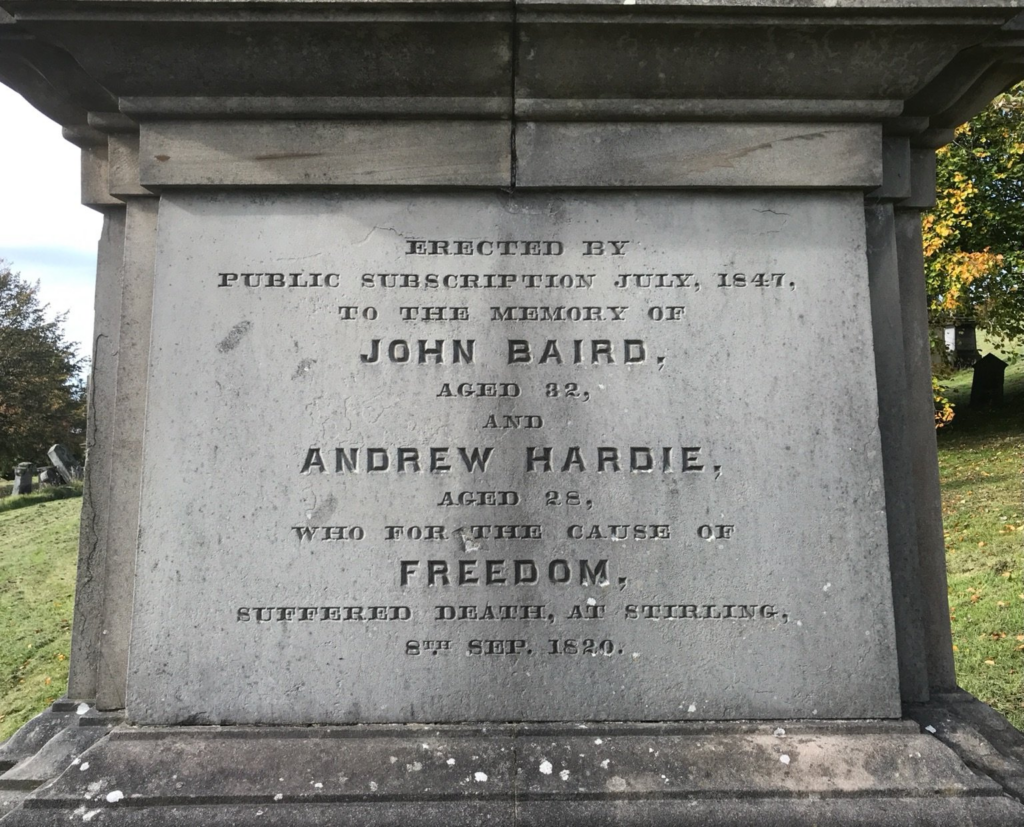
It only remains to add that in 1846 the Stirling authorities were again asked to allow the monument to Baird and Hardie to be erected over their grave in Stirling Churchyard, but permission was refused, for what reason we know not. The monument was thereupon removed to Sighthill Cemetery, Glasgow, where it was erected near the convergence of two of the main walks, and application was made to the Home Secretary to exhume the remains of the political martyrs so that they might be re-interred under the monument. That official’s sanction having been obtained, on condition that there should be no public ceremonial on the occasion, the remains were lifted on Tuesday, 22nd July, 1847, and quietly transferred to Sighthill Cemetery. It was not, we believe, until 1856, or thereby, that the empty grave in Stirling Churchyard was marked by the pawl-stones, one of which is still to be seen. The pawl-stones were made and inscribed with the initials of the unfortunate men by Mr James Ronald (now Baillie Ronald) who was then working at the High School. We are pleased to find that the Baillie still takes an interest in the spot and that his proposal to mark the ground in a suitable manner (which was the cause of our undertaking to tell the “Story of Baird and Hardie”) is likely to be carried into effect. The Cemetery Committee and their Convenor, Councillor Dowdy, have agreed to co-operate with Baillie Ronald in the matter, and it is expected that an arrangement will be made by which the ground will be acquired by the Committee and preserved in all time coming. The question of how the ground is to be marked for the information of visitors to Stirling, will likewise receive due consideration, and we are sure that Baillie Ronald and the Convenor of the Committee will receive the support of the public in erecting a proper memorial of the political martyrs who were interred in Stirling Churchyard.

“The Story of Baird and Hardie” has extended to a greater length than we anticipated when we began the work, but we thought it would be as well, when we were about it , to collect and arrange in a sequential way all the materials we could find, the history of the Radical rising at Bonnymuir and its consequences having never before been related with any degree of fulness. We have the intention of adding by-and bye a chapter or two on the Radicals of St Ninians and Cambusbarron, but meantime we bring our task to a close with the hope that some of our readers may have gained a little information from our labours. We have frequently been asked whether there is any likelihood of “The Story of Baird and Hardie” appearing in a separate form, and all we can say is that we are considering the matter. We intend, at any rate, to implement our promise to give an illustrated supplement showing certain relics of Baird and Hardie, together with a portrait of Richmond the Spy. Its appearance will be duly announced.
[THE END]


